Read the original interview: Hendy means business at Network Rail.
Your responses to Sir Peter Hendy’s views
In the last issue of RailReview (Q4-2015), Nigel Harris exclusively interviewed Network Rail Chairman Sir Peter Hendy CBE on the challenges he faces in his new role and his plans for the company.
Hendy spoke on a number of subjects including devolution, industry investment, the need for sufficient scoping of engineering projects, and other areas of topicality.
The interview generated much discussion and debate in the industry, and a number of RailReview Editorial Board Members and readers expressed a desire to respond to the interview and have their say on the issues raised. As such, we’ve created a new section in this issue to act as a platform for you to have your say on the big debates. We’ll provide this service in RailReview as often as you want it to be here.
- Anyone who still wishes to respond to the interview with Sir Peter Hendy can do so by emailing [email protected] and we will consider your comments for the RailReview website
You can either read all responses by selecting Next below, or select a specific review from the list as follows:
- Richard George - Group Managing Director, Rail and Transit Engineering, SNC-Lavalin
- Elaine Greenwood - Head of Sales, ESG Rail
- Martin Fleetwood - Partner in the Transport & Infrastructure Group at law firm Shoosmiths LLP and an Independent Board Member of UK Tram
- Andrew Boagey - Chairman of the Railway Engineers’ Forum
- Fred Garner - Senior Director – Rail, Taylor Woodrow
- Stephen Joseph - Chief Executive, Campaign for Better Transport
- David Simpson - Production & Safety Director, Caledonian Sleeper
- Terence Watson - Managing Director Alstom UK and Chairman of the Rail Supply Group
 Hendy review: Richard George
Hendy review: Richard George
Group Managing Director, Rail and Transit Engineering, SNC-Lavalin
Firstly, I was struck by how ‘authentically Peter’ it sounded - I could hear him saying it all. It was refreshing to hear so much common sense and a solid, pragmatic management approach to dealing with the issues, rather than a theory of what ‘might’ be done one day.
It was also rooted in a solid grasp of the history of how we got here and the massive challenges of the growth required ahead. But having worked with him before, none of that was a surprise.
Secondly, I was reminded that whatever financial dynamic you set up, ultimately that is what you get back. There are specific financial dynamics that you plan to create - but there are also the inadvertent dynamics that emerge.
I once made a presentation to the emerging Rail Regulator, the emerging Franchise Office and the BR Privatisation unit, entitled ‘How to run your Franchise from the Bahamas’. It had the same theme - whatever dynamic is set up will come back at you in spades in the end.
The comment Peter made about the RAB mechanism, which implied that ultimately it didn’t matter how much was spent on a project it would be funded anyway, is no doubt simplistic - but at its heart is a dynamic that has been deeply unhelpful for management control.
Thirdly, I thought the relationship he described between a 30-year Strategic Plan and the context it provides to any ten-year Business Plan or five-year Control Period was spot on.
My comment on this would be that it must be a Strategic Plan owned by and created by Network Rail. There are all sorts of things that governments and departments can decide for you about context, structure and budgets, but ultimately the Plan, the Strategy and the Vision for an organisation must be owned internally - they are crucial elements of the unifying glue and engagement. If it is externally ‘delivered’, then the management, the staff and everyone associated are disempowered.
Finally, the part that made me smile the most: Peter’s insistence that the real customer is not the regulator, nor the Government, nor the TOCs, nor any piles of KPIs - but the guy “standing waiting for a train to Liverpool”. Quite!
Read the original interview: Hendy means business at Network Rail.
 Hendy review: Elaine Greenwood
Hendy review: Elaine Greenwood
Head of Sales, ESG Rail
I welcome the appointment of Sir Peter Hendy to the position of chairman at Network Rail. Sir Peter is a railway man, with a superb reputation for getting things done.
He seems to have quickly grasped the issues and understand what needs to be done and how. His belief that rail is important both socially and economically, together with a seemingly realistic hold on costings, gives me faith that he will deliver the necessary improvements on time and within the new budget. It is also great to see how he has put the travelling public and the operators at the heart of his decision-making.
The Midlands contains a wealth of engineering and manufacturing expertise. It is therefore important to have a transport system, in particular a rail network, that reflects and supports the growth of the region. Projects such as HS2 and the electrification of the Midland Main Line are vitally important, both in terms of rebalancing the economy (by providing a faster and more frequent rail service) and in reducing the environmental impact of the railways.
Read the original interview: Hendy means business at Network Rail.
 Hendy review: Martin Fleetwood
Hendy review: Martin Fleetwood
Partner in the Transport & Infrastructure Group at law firm Shoosmiths LLP and an Independent Board Member of UK Tram
This is a very astute view of Network Rail from someone who really knows how to make a transport system work.
It is also a good time for Network Rail to have someone in a senior leadership role who has already had to really think about how a transport system affects its passengers, rather than trying to work out who might be “the customer”.
However, Network Rail as a whole needs to take guidance from its new chairman and consider how it is positioning itself. A chairman can only do so many things, and both the board and the company will need to want to change.
There is a strong theme of the ‘power of 3’ in the interview. Three reports - Bowe, Hendy and Shaw - to focus on what has been done and how it is being done, and how it can be done better in the future.
There is also a strong influence of people who have achieved some ground breaking projects that needed to look a number of years into the future: Hendy with Transport for London, Mark Carne with Shell and BG; and Richard Brown with Eurostar and National Express. Also there are the three themes of the Shaw report to deal with: growth, passengers and devolution.
So I thought I should add my own ‘power of 3’ to fit within this theme:
- Targeted investment in infrastructure to meet long-term growth - having a long-term infrastructure plan and sticking with it. This includes installing enabling infrastructure when other work is being done, to look at getting short-term benefits before it comes part of a bigger structure. Think parts of the M25 in the 1970s and 80s.
- Opportunities for private sector investment. Pension and investment funds are looking at opportunities in infrastructure, and Network Rail should look to embrace these. Working with infrastructure funds to add new (or reinstate abandoned) infrastructure, to create new routes that fit with the longer-term demographics of the country. Potentially this could also help to spread out some of the strain on overused parts of the Network Rail system.
- Integration of the rail system with other modes of transport. We are already seeing this in projects such as Birmingham New Street, which will link train, tram, bus, taxi and bicycle with car and pedestrian. However, the Gainsborough Central footbridge is not a particularly high point. While Sir Peter cannot review every project, he can set the bar for managers to ask questions such as: “What is the passenger benefit from this work?”
With a new triumvirate at the helm of Network Rail, and the conclusions of the three reports to work through in 2016, this could be the start of a rejuvenation of Network Rail that will set some good foundations for the rail network into the next 50 years or so. For an island where transport and connectivity will become even more important, I do hope so!
Read the original interview: Hendy means business at Network Rail.
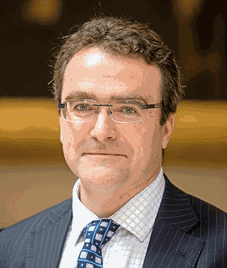 Hendy review: Andrew Boagey
Hendy review: Andrew Boagey
Chairman of the Railway Engineers’ Forum
Two great interviews in RailReview Q4-2015. Two powerful reflections on the state of the rail industry, both from very senior figures who are passionate about the challenges that we face and the mistakes that have been made in the past.
Both Sir John Armitt and Sir Peter Hendy are extremely well respected, and both acknowledge the extraordinary and demanding nature of the task in hand: running a safety-critical multi-disciplinary transport asset that has never been more important to the health of the British economy.
Sir John reflects on how it was necessary to stabilise the industry after the Hatfield crash and how he brought maintenance back in-house. “One of the best decisions we ever made because it gave us back control of the assets”.
He is also quoted as saying that Railtrack lost both knowledge and control as it placed its assets in the hands of its sub-contractors. At very considerable cost, indeed - including to its reputation.
Messing with the organisation and contracting structure of the rail industry has consequences. More than a nod towards the Shaw Review into the future organisation and funding at Network Rail, one might suspect, and a comment that will surely not be lost on Sir Peter Hendy, who clearly understands how to work in tandem with Westminster.
Reading the interview with Sir Peter, he makes three particularly memorable points.
It is evident that he is a realist. Bringing private sector funding into the railway has been tried before, he says, with limited success. Firstly in Railtrack (see above), and secondly in the form of the Regulated Asset Base. Neither has survived in its original form. Yet Sir Peter still points out that the railway “has to be able to maximise third party financial input”. Yes, of course.
And we await the Shaw Review conclusions with interest. I wonder: unless you have a very fine railway asset (such as HS1), or one that is relatively easy for fund managers to assess, maybe we should not expect too much in this area, with or without devolution.
Secondly, Sir Peter is clearly a man who knows who his customers are. Not the ORR, by the way, as some might have assumed. He makes it quite clear that “regulation is in no way a substitute for good customer service”.
And finally, Sir Peter is someone who knows what it is to get good managers onto his team, and the importance of growing them into the future leaders that the railway needs: “You always want someone to ask the intelligent questions”; “decent local managers to take a sensible view”; and the classic line “what I would expect of a devolved organisation is that the people running it on a more local basis would make some intelligent interventions to stop pissing money down the drain”.
An unambiguous message, not likely to be lost on his front line troops or on the strategic commanders, I suspect!
Two leaders who know the rail industry well, who know how challenging it can be, and who know the importance of getting good people to lead it from within.
Read the original interview: Hendy means business at Network Rail.
 Hendy review: Fred Garner
Hendy review: Fred Garner
Senior Director – Rail, Taylor Woodrow
Sir Peter clearly already understands many of the key challenges faced by Network Rail. For businesses working with NR to design and deliver the infrastructure upgrades integral to the CP5 and CP6 plans, his observation that the “biggest mistakes have been when the railway has tried to do something which is not properly scoped, planned or costed” will strike a chord.
They are interesting and challenging projects that people want to work on. They are procured through a competent and thorough process with a strong emphasis on collaboration. But they seem destined not to hit the ground running in mobilisation and early design, exactly as Sir Peter calls it - through scope gaps, incomplete data on existing assets, unforeseen interfaces. Resourcing at the right time with the right knowledge and experience and in the right places is also a challenge, something that applies not only to the rail sector but to construction as a whole.
I was lucky enough to work with an excellent Network Rail team during the King’s Cross redevelopment project, which set for me a benchmark for how a complex, multi-disciplinary project in a live operational environment can be delivered. I recall strong leadership, a desire to build and foster good working relationships at all levels, and a unity of purpose through clear consistent communication, backed up by stable resources in all the right places.
It was on this project that NR’s Project Director explained to me how he saw their key role as being the enabler, working upstream of the designer and contractor teams to sort out scope, get stakeholder buy-in, agree an access strategy, and get budgets (including suitable contingency) approved. The project team were then empowered to deliver within their agreed remit. It wasn’t all plain sailing, and there were scope gaps and a few unexpected situations on the way, but because decisions were made and relationships were strong, it was possible to work out the solutions and implement them. It was a great overall experience to be made to feel part of that bigger team, and it got the best out of us and our supply chain.
Sir Peter also talks about his expectations from a devolved organisation - “the people running it on a more local basis would make some intelligent interventions”. One challenge this model might face is where a project expands beyond that of a local knowledge horizon, where scope has to be developed as part of a larger programme incorporating new infrastructure and new train fleets over a large geographical area. At the outset all the requirements are unlikely to be defined. Such projects require a higher degree of upward-facing activity, with extensive pre-planning, control and integration to capture the impact on existing infrastructure. There are also significant relationships to be managed - with the TOCs, with third parties such as local authorities, and statutory bodies such as The Environment Agency or English Heritage.
Here, the ability to identify and then make decisions quickly is important. This is allied to the need for governance and control of budgets. Bringing the two together, in a timely manner so as not to have an impact on the project delivery, isn’t straightforward. Added governance from being part of the public sector and a stretch on resources are major constraints. Creating agile decision-making capable of dealing with the myriad of operational, contractual and commercial issues upstream and downstream will be challenging.
I recently took part in a discussion session at which Nicola Shaw spoke and answered questions about her Review of the Financing and Structure of Network Rail. It made me wonder if NR’s role as an enabler will feature in the recommendations, although there isn’t a “one size fits all” model to the enabler role, and the needs of a complex major project are very different to that of a local infrastructure enhancement or renewal.
There are, however, some very dedicated people from Network Rail and the businesses that support it working day, night, weekends and Bank Holidays. They deliver complex engineering solutions to the point where a lot of it is taken for granted and unseen. Opportunities remain for the environment and structure in which those people and their businesses work to be more streamlined, more efficient and to deliver more, with better returns for them, NR and the rail network as a whole. It is to be hoped that Sir Peter, with support from his colleagues, continues to look at what can be done to realise these opportunities.
Read the original interview: Hendy means business at Network Rail.
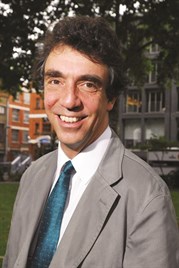 Hendy review: Stephen Joseph
Hendy review: Stephen Joseph
Chief Executive, Campaign for Better Transport
Peter Hendy’s interview typically gets lots of things right. He is absolutely right to highlight the need for a long-term
national plan for the railways, about the ability this gives for proper scoping of projects, and about the need for devolution within this plan so that people on the ground are empowered to make sensible decisions.
However, I think he and Mark Carne have yet to get to grips with the culture within Network Rail itself. It comes across at present as quite bureaucratic and inward looking and also ultra-cautious and conservative, looking to find reasons for rejecting things or inflating costs rather than helping people who want to invest in and support the railway.
I say this as someone who wants Network Rail to succeed. We need a strong national infrastructure operator that works for passengers and freight users as well as for the wider communities the railway serves. Breaking it up and selling it off, as some are now proposing, won’t help users or the wider world - if anything such fragmentation is likely to make things worse.
Sadly NR doesn’t help itself, and there is a real danger of a spiral whereby critical and negative public reaction makes NR even more cautious and withdrawn, and it loses some good people fed up with being criticised or with extensive bureaucracy… hence making the organisation even more likely to manage things badly and face even more criticism.
NR needs to lead the rail industry into outgoing, active partnerships with the wider world - with local authorities (see my column on page 22), with operators and with rail users.
This is not an easy cultural change to make, but it is essential if NR, and the industry as a whole, is to take advantage of the growth in rail use and the investment flowing into the railways that Peter rightly welcomes.
Read the original interview: Hendy means business at Network Rail.
 Hendy review: David Simpson
Hendy review: David Simpson
Production & Safety Director, Caledonian Sleeper
The interview with Sir Peter Hendy considers a whole range of weighty issues such as structure, ownership and funding, as well as the opportunities for devolution to improve local decision-making - and stop wasting money.
Whatever the outcome of the various reviews taking place, and however long any changes may take to implement, there are still ways in which Network Rail can work more effectively in the short term to deliver to customers. And it was particularly pleasing to read that Sir Peter sees customers as those who pay to travel and move freight on the network, as opposed to a large pile of regulatory measures!
The recent severe weather has shown how well Network Rail can respond in adversity, demonstrating speed of delivery, flexibility and responsiveness. As an example, the closure of the West Coast Main Line at Lamington meant that Caledonian Sleeper had to find a way to run our ‘Highlander’ service without extending journey times to unattractive levels. The solution was to run from King’s Cross.
It took less than a week from idea to the first departure, with a superb response from many parts of NR as well as our other industry partners GB Railfreight and Alstom - all parties working together extremely effectively to deliver the common goal of a great result for our customers. Processes that normally take weeks, months or even years just happened, and there was ownership at all levels in NR for getting the right result.
We must capture this type of response and apply it to normal circumstances so that customer needs can be responded to with more urgency. The often glacial progress of minor enhancements and network changes is in sharp contrast to what has been achieved during Lamington, and previously with examples such as the temporary station at Workington North. The oft-quoted comment that processes which take six months actually take six hours spread over six months has been proved to be true time and time again!
The opportunity for the industry (not just NR, as this is about working together) is to pick some ‘quick wins’ that can be used to show what can be done to replicate ‘crisis’ behaviours (responsiveness, pace, and flexibility) as the norm, harnessing local knowledge to the common objective of making a real difference to customers.
It shouldn’t need an alliance to work together with the right behaviours to do the right things in the right way (at the right price) for our industry’s customers. And whatever the future holds for NR, at local level we need to make this happen. If we can achieve this, a celebratory visit to the brewery will be justified!
Read the original interview: Hendy means business at Network Rail.
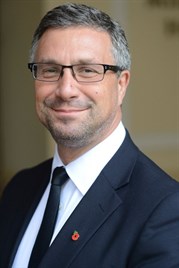 Hendy review: Terence Watson
Hendy review: Terence Watson
Managing Director Alstom UK and Chairman of the Rail Supply Group
I am writing as chairman of the Rail Supply Group (RSG), the Sector Council established in 2014 to drive collaboration and growth in the rail supply chain.
Sir Peter’s interview was read with interest by our Council, given the significance of NR’s plans to our future. Knowing Sir Peter, it will come as no surprise that he had sought us out earlier to counsel our opinions, and we therefore noted and particularly welcomed his comments on the future of planning in the railway, a point of massive importance to his suppliers. I think it was also important to us all that he made it clear early on that his customers are both the passengers and the operators of the UK train fleet, de-fugging this over-discussed intellectual point.
It’s worth pointing out that NR has been an active member of our Council from the start, and the policies it is forming under Sir Peter’s and Mark Carne’s leadership are perhaps starting to be more aligned to industry needs and aspirations. So, yes, we support Sir Peter’s thoughts on long-term planning. Planning is crucial for the railway, helping operators manage beyond a franchise term and giving suppliers confidence to invest in new designs, new plant, and recruit skilled teams across the UK far further ahead than is currently the case.
Sir Peter’s suggestion that a 30-year plan for rail should be developed on the model of London’s transport strategy is something many in the industry will certainly support and RSG would like to be involved in. That is why, in our rail strategy, launched on February 1, we set out plans to reform rail supply that will have a sustained impact for the next ten to 15 years and beyond, including increasing engagement in skills and innovation.
Long-term planning will build on the good work of industry-led initiatives, such as the about-to-be released long-term Rolling Stock Strategy. The Government’s National Infrastructure Commission will also be essential in shaping and supporting long-term strategy for the whole economy.
Nicola Shaw is about to release her formative report into the future shape and funding of Network Rail. Its timely and comprehensive examination of the structure of the body is welcome. I’m confident that the right people are involved and have approached the review in an open way.
Read the original interview: Hendy means business at Network Rail.


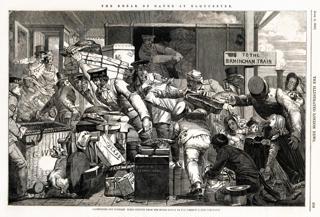
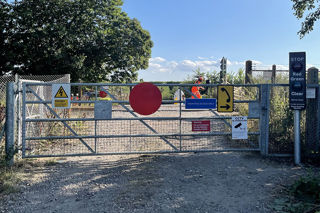
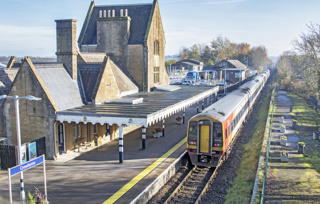
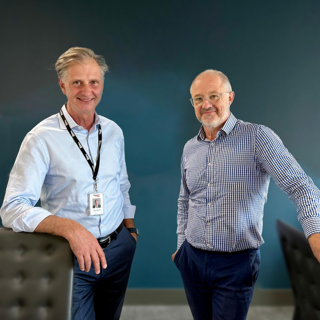











Login to comment
Comments
No comments have been made yet.